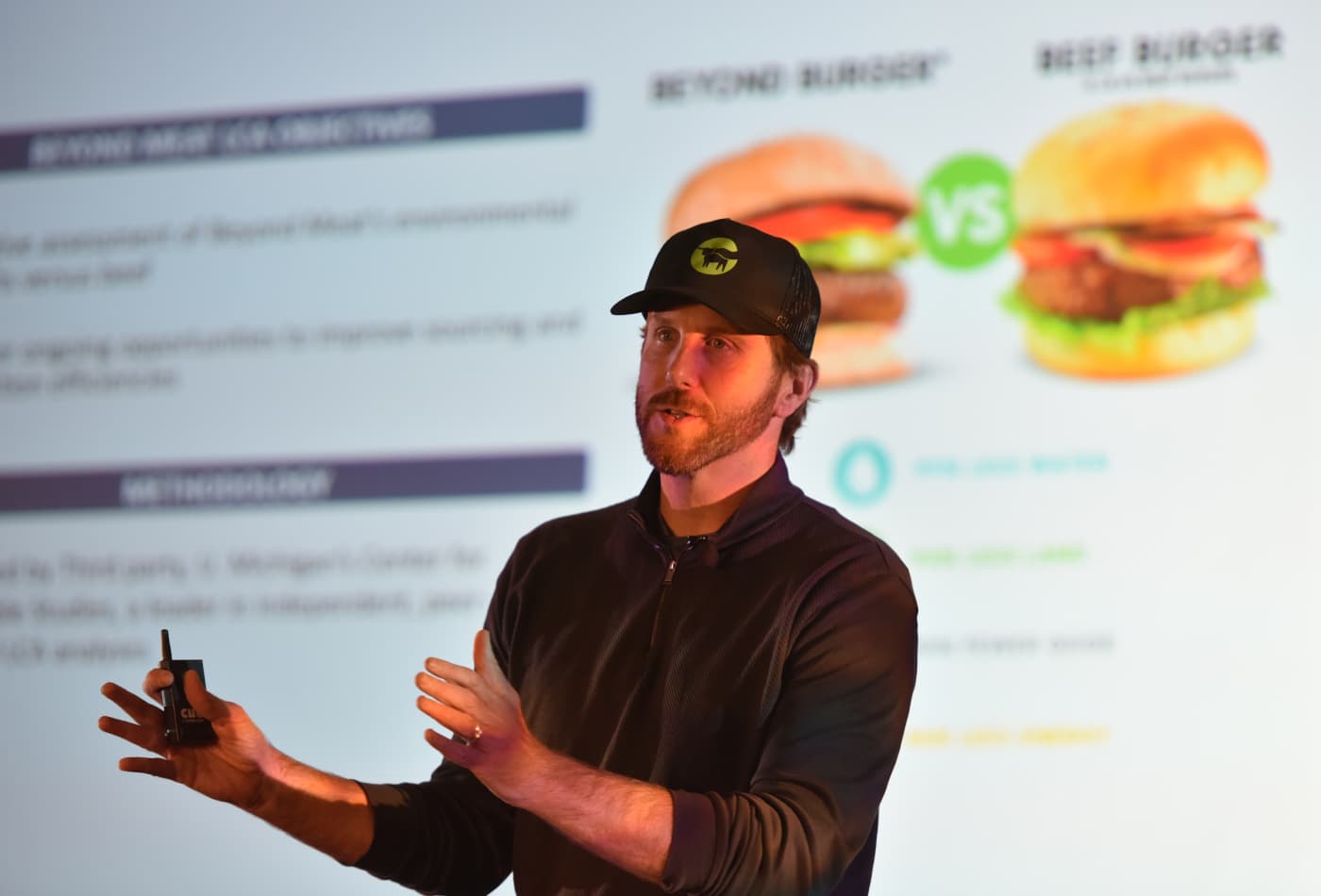Beyond Meat CEO on early naysayers: A new idea is ‘crazy until it’s not’
When Ethan Brown quit his day job as a clean energy executive in 2009 to launch plant-based protein company Beyond Meat — most famous for making a juicy vegan burger that “bleeds” like a beef burger — people thought he was crazy, he says.

Ethan Brown CEO of Beyond Meat talks during the Unlocking the Future of Protein Speaker Series at the Wellness Your Way Festival at the Colorado Convention Center on August 17, 2019 in Denver, Colorado.
Tom Cooper | Getty Images Entertainment | Getty Images
“I can remember bringing [products] to my kids’ baseball and softball games and parents were kind of like, ‘nah,’” Brown, CEO of Beyond Meat, tells CNBC Make It.
But Brown says he never had a “single doubt in his mind” that Beyond Meat would eventually become successful.
Brown tapped into his 401(k) accounts and his kids’ saving accounts and sold one of his houses to keep the company afloat in the early days. In 2013, Brown even had trouble getting a hotel room for a meeting with billionaire Bill Gates, who he was set to pitch as an investor, because his credit cards were maxed-out. (Gates invested an undisclosed amount in the company later that year.)
“I didn’t know the scale of the success, but I knew that this was something that the world needed,” Brown tells CNBC Make It.
Today, Brown is reportedly worth close to $400 million and Beyond Meat is valued at around $7.7 billion. In 2019, Beyond Meat had one of the most successful IPOs since the dot-com bubble days in 2000, when its shares soared 163% from the $25 offering price on the first day of trading. (Its stock is currently trading at around $123).
Beyond Meat has also attracted big investors besides Gates, like Twitter co-founder Biz Stone and actor Leonardo DiCaprio. And it has scored high profile partnerships with the likes of KFC, Subway and Dunkin Brands.
Even amid the pandemic, Beyond Meat has experienced record sales growth. Grocery store sales for Beyond Meat have climbed 69% during the second quarter year over year thanks to consumer stockpiling, according to The Wall Street Journal.
Now, Brown says, those same parents who blew off Brown’s Beyond Meat products at their kids’ games are buying the product.
As with any innovation, “it’s crazy until it’s not,” Brown says.
“It’s really important to tether yourself to something that is bigger than who you are,” says Brown, because “when you have unwavering conviction about something, you are willing to be marginalized for awhile.”
For Brown, Beyond Meat’s mission to improve people’s health, affect climate change and support animal welfare is what kept him going and still does.
Brown contends that eating Beyond Meat — the burgers are made from a blend of non-GMO and hormone- and antibiotic-free “pea, mung bean and rice proteins,” canola oil, coconut oil and beet juice for color — is healthier than eating animal meat. And according study commissioned by Beyond Meat with the Center for Sustainable Systems at the University of Michigan, a plant-based burger generates 90% less greenhouse gas emissions, requires 45% less energy, has 99% less impact on water scarcity, and 93% less impact on land use than a 1/4 pound of traditional U.S. beef. And of course, no animals are slaughtered to make plant-based protein.
But even with Beyond Meat’s commercial success, there are critics who say plant-based meats are highly processed, as well as high in fat and sodium, and that they are therefore unhealthy.
Brown, of course, disagrees. To debunk health critics, Beyond Meat funded a small study at Stanford University that swapped regular meat products with Beyond Meat products for 36 adults (ages 20 to 70) for eight weeks. The study was lead by Christopher Gardner, PhD, professor of medicine at the Stanford Prevention Research Center and was published in the American Journal of Clinical Nutrition on August 11. Beyond Meat was not involved in designing or conducting the study.
It concluded that there were no adverse effects of eating plant-based meat compared to regular meat during the two months.
Gardner tells Make It that, among other findings, the Beyond Meat eaters’ had lower levels of LDL cholesterol (known as the “bad” cholesterol) at the end of the study, and participants also lost an average of two pounds.
“My kids eat so much of this product and I eat so much of it, and my broader family eats so much of it. So it’s really important to me that we’re not running an experiment on our families or on our children,” Brown says.
However Dr. Frank Hu, chair of the nutrition department at the Harvard T.H. Chan School of Public Health and co-author of the paper “Can Plant-Based Meat Alternatives Be Part of a Healthy and Sustainable Diet?” for The Journal of the American Medical Association, says more research is still needed.
″[T]he perceived health benefits of consuming plant-based meat instead of traditional meat products are yet to be substantiated by rigorous clinical studies,” Hu said.
However, he does believe plant-based meat can offer “viable option” for individuals who want to reduce their meat consumption.
Diets high in red meat (especially processed meats) are associated with a range of health problems like obesity, Type 2 diabetes, cardiovascular disease and some cancers.



 Print the article
Print the article